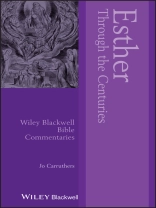This interdisciplinary commentary ranges from early midrashic
interpretation to contemporary rewritings introducing
interpretations of the only biblical book not to mention God.
* Unearths a wealth of neglected rewritings inspired by the
story’s relevance to themes of nationhood, rebellion,
providence, revenge, female heroism, Jewish identity, exile,
genocide and ‘multiculturalism’
* Reveals the various struggles and strategies used by religious
commentators to make sense of this only biblical book that does not
mention God
* Asks why Esther is underestimated by contemporary feminist
scholars despite a long history of subversive rewritings
* Compares the most influential Jewish and Christian
interpretations and interpreters
* Includes an introduction to the book’s myriad
representations in literature, music, and art
* Published in the reception-history series, Blackwell Bible
Commentaries
Tabela de Conteúdo
List of Plates xi
Series Editors’ Preface xiii
Acknowledgements xv
Introduction 1
Why Reception? 2
An Irredeemable Book? 7
Jewish Tradition 10
Christian Tradition 12
Summary of Works 13
Godless Scripture 21
Allegory 28
Providence, Chosenness, Nationhood 32
Political Application 46
Esther as Literature 49
Esther 1:1-9 52
1:1 The King and Empire 53
1:3 The King’s Feast 57
1:4 Display of Wealth 58
1:8 No Compulsion to Drink 59
1:9 Women’s Feast 60
Vashti 61
Esther 1:10-22 68
1:12 Disobedience 68
1:13-22 The Empire Strikes Back 83
1:19 Vashti’s Punishment 88
1:22 The Decree 89
Esther 2:1-7 93
2:1 The King Remembers Vashti 93
2:2-4 To the Harem 95
2:5-6 Mordecai 98
2:7 Hadassah- Esther 103
Esther 2:8-23 109
2:8-14 Esther in the Harem 109
2:15 Esther’s Beauty 121
2:16-18 Esther Becomes Queen 125
Esther 3 133
3:1 Haman 134
3:2 ‘But Mordecai did not bow down’ 139
3:7 Casting Lots 143
3:8 (Mis)Representing Jews: A People Set Apart 145
3:8 Evil Counsellors 151
3:12-15 Genocidal Edicts 155
3:15 ‘The King and Haman sat down to drink’ 157
Esther 4:1-14 160
4:1-3 ‘Great mourning among the Jews’ 160
4:4-14 Esther and Mordecai Confer 163
4:14 ‘From another quarter’ 174
Esther 4:15-17 176
4:15 ‘Fast ye for me’ 176
4:16 ‘If I perish, I perish’ 180
Esther as Exemplar of Resolve 184
4:17 ‘Mordecai [. . .] did everything as Esther had ordered him’ 191
Esther 5 192
Esther before Ahasuerus 192
5:4-8 Esther’s First Banquet 215
5:9-14 Haman’s Wrath 218
Esther 6 221
The King’s Sleeplessness 222
6:11 The Triumph of Mordecai 227
Esther 7 and 8 233
7:1-6 Esther’s Second Banquet 233
7:7-8 Haman’s Fate 238
8:1-6 ‘How can I endure to see the destruction of my kindred?’ 244
8:7-14 The Irreversible Decree 244
8:15-17 ‘The Jews had light, and gladness, and joy, and honour’ 249
Esther 9 and 10 254
9:2 Scenes of Slaughter 256
9:7-10 Ten Sons of Haman 265
9:26 Purim 267
9:29 & 32 ‘Then Esther the Queen . . . wrote with all authority’ 275
10 The Greatness of Mordecai 277
Bibliography 280
Primary Sources
Pre- 1500 280
1500-1800 281
Post- 1800 284
Esther Secondary Sources 289
Other Secondary Sources 293
Index 296
Sobre o autor
Jo Carruthers teaches at Lancaster University, UK, and works across the disciplines of literary and religious studies. Her books include The Politics of Purim: Law, Sovereignty and Hospitality in the Aesthetic Afterlives of Esther (2020); England’s Secular Scripture: Islamophobia and the Protestant Aesthetic (2011); and Literature and the Bible: A Reader (with Mark Knight and Andrew Tate, 2013).












